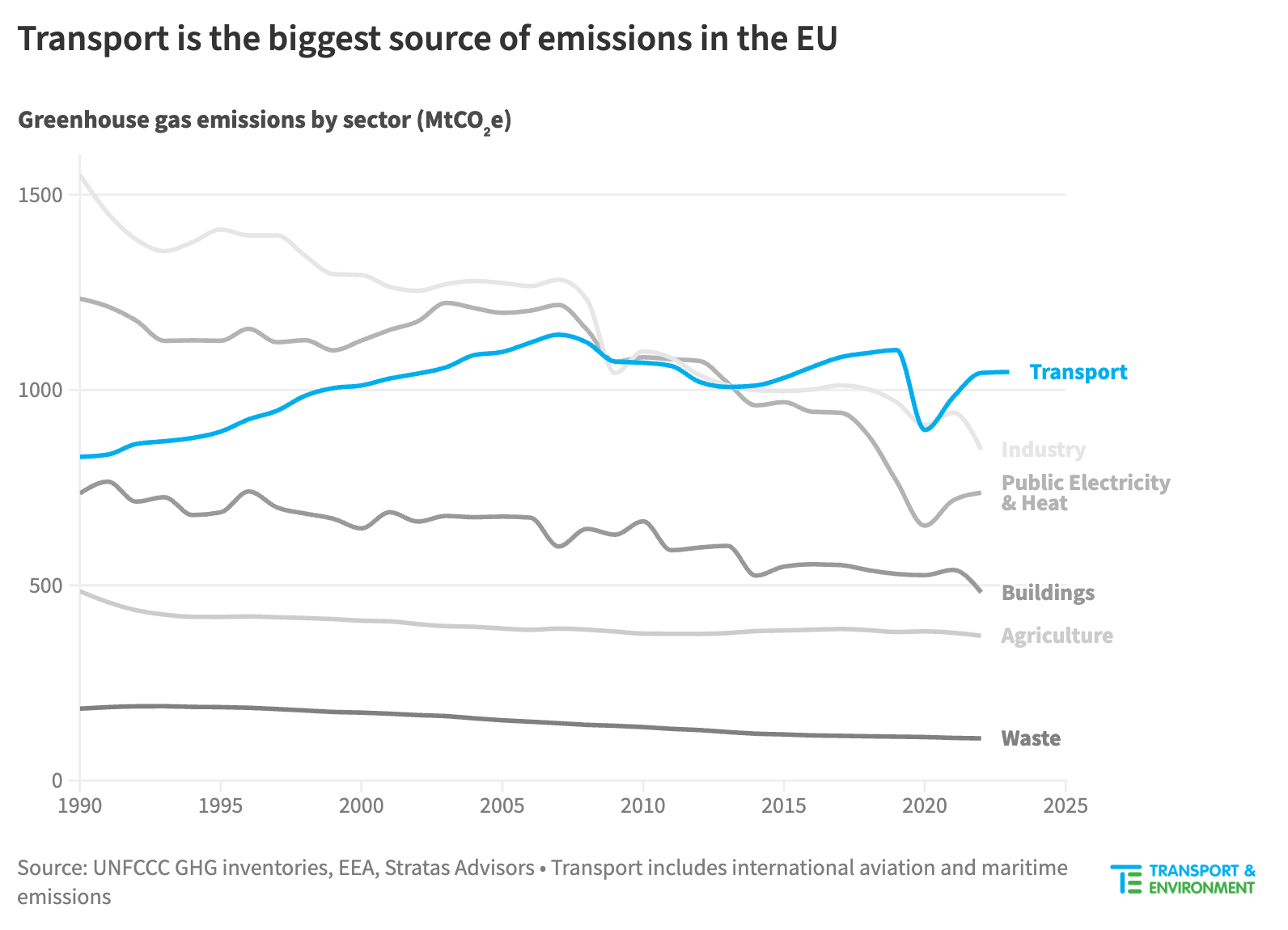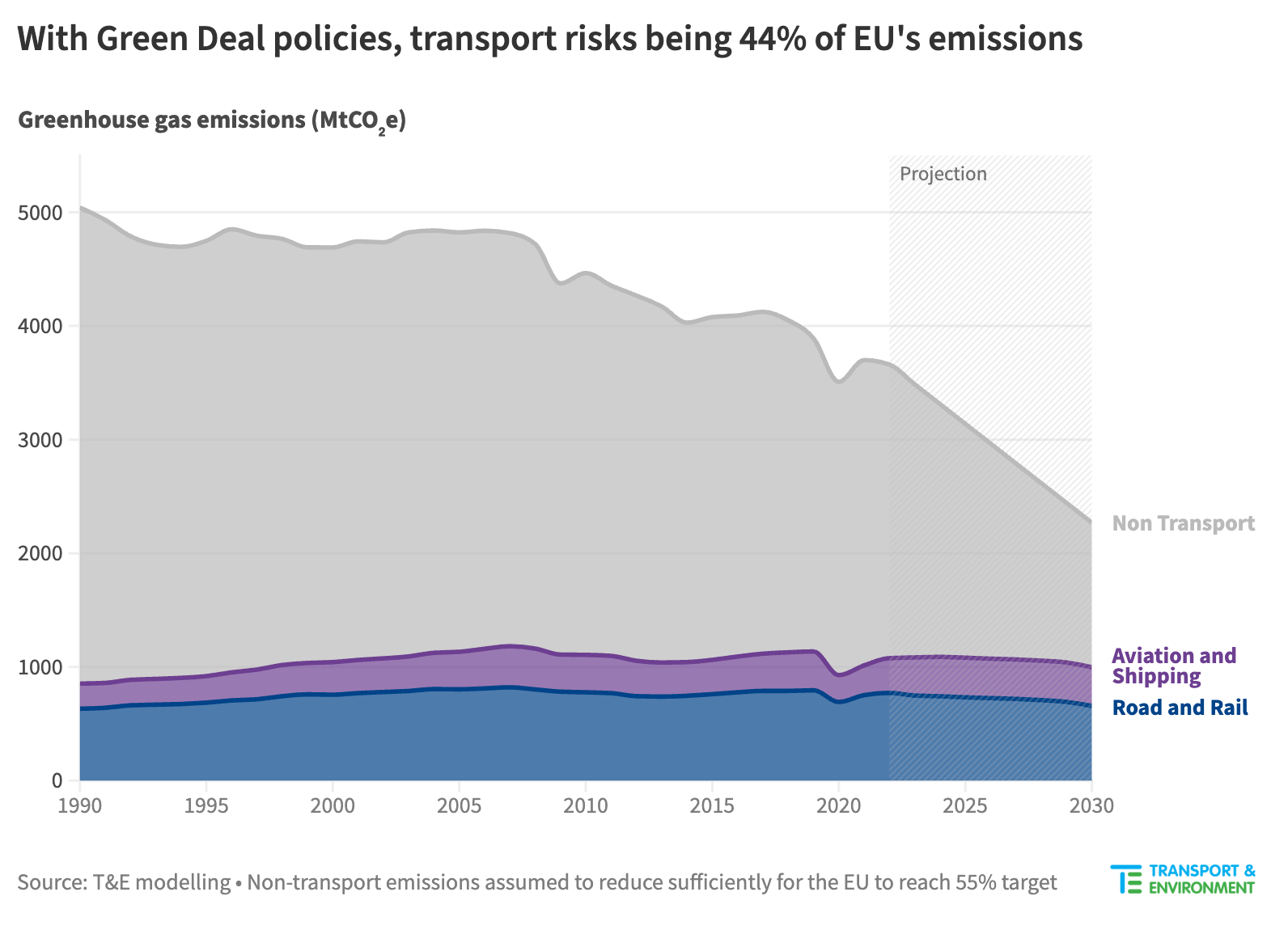Transport alone is set to make up nearly half of Europe’s greenhouse gas (GHG) emissions in 2030, new Transport & Environment (T&E) analysis shows. European transport emissions have increased by more than a quarter since 1990, and T&E’s State of European Transport analysis finds that while emissions across the wider economy are already in decline, transport emissions continue to grow. Europe must start taking its transport emissions problem seriously if it is to achieve net zero in 2050, says T&E.
Since its peak in 2007, transport has been decarbonising more than three times slower than the rest of the economy. Under current climate policies its share could reach 44% of all GHG emissions by 2030, up from 29% today. Transport emissions in the EU are now more than 1000 MtCO2e, equivalent to the total emissions of Germany and the Netherlands combined. While transport emissions are unlikely to return to their most recent peak in 2019, unless additional measures are taken Europe will fail to reach net zero in 2050.
William Todts, Executive Director of T&E, said: “The good news is transport emissions in Europe have peaked. The bad news is other sectors are decarbonising three times faster. In 2030, nearly half of the continent’s emissions will come from mobility, making it the problem child of Europe’s climate efforts. Decarbonising the sector as quickly as possible is now vital if the continent is to reach zero by 2050.”
Cars burning petrol and diesel are the overwhelming source of transport emissions, accounting for more than 40%. Car dependence has increased since the 1990s, enabled by motorway building and a growing car fleet. Only recently are we starting to see a reduction in average car emissions as a wave of electric vehicles come to the market.
Aviation emissions have doubled in the past 30 years – faster than any other transport sector. The additional impact of aviation emissions from contrails potentially triples the climate impact of flying.

The analysis looks at the impact of the EU’s climate regulations in addressing runaway transport emissions, and finds that they will reduce transport emissions by just 25% compared to 1990 levels in 2040 and by 62% in 2050. Cars, vans and trucks bought between now and the mid-2030s will still be driving on European roads, burning petrol and diesel for years to come. Shipping operators have little incentive to increase their operational efficiency, and demand for flights, spurred on by increasing airport capacity, offsets any gains from green fuel uptake this decade.
T&E’s analysis highlights that as well as fully implementing key Green Deal policies, additional efforts will be needed to fully decarbonise transport. These include:
- Preventing new and ever growing demand for transport, by halting new airport and motorway capacity expansion, is key to reducing the renewable energy required to decarbonise the sector.
- Ambitious and binding electric vehicle sales targets for companies that own large fleets of vehicles are key to accelerating the transition to zero-emissions. Coupled with measures to prevent growth and to tackle the existing car stock, these could cut emissions by a further 213 MtCO2e savings in 2040.
- Unlocking efficiency gains in the shipping sector could save an additional 93 MtCO2e in 2030, crucial for charting a course to zero emissions by mid century.
- Direct electrification of road transport is more than 2 times more efficient than hydrogen power, and 4 times more efficient than using e-fuels. Europe cannot afford to waste renewable electrons.
- Preliminary data shows that road transport emissions reduced by 8 MtCO2e last year and shipping by 5 MtCO2e. This reduction was undone by the continued rebound and growth of aviation emissions, which increased by 15 MtCO2.

Todts continued: “Cars, trucks and vans can be cheaply electrified with batteries and renewables. This is now some of the lowest hanging fruit in climate action. Planes and ships pose a tougher challenge, and require a big effort from fuel suppliers to scale green fuels like e-kerosene and ammonia, and a plan to eliminate aviation contrails. Putting an end to road and airport expansion makes the decarbonisation job a lot easier.”
ENDS
Note to editors
The State of European Transport 2024 will be launched at a high level event held in Brussels. To register for the webinar please visit the event page here.
Transport emissions include international aviation and shipping.


